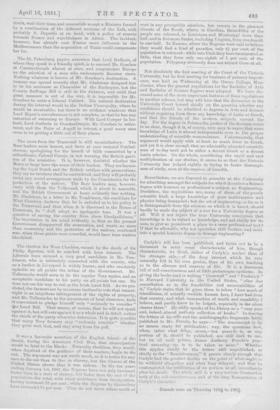Carlyle's will has been published, and turns out to be
a document in some sense characteristic of him, though characteristic, we think, rather of Carlyle's weaker than of his stronger side,—of the deep interest which he very naturally felt in his own genius, than of his own teaching as to the silences and reserves of life. It is a document full of self-consciousness and of little picturesque egotisms. In giving the books used in writing " Cromwell " and " Fred oriels " to Harvard University iu the United States, " after due consultation as to the feasibilities and excuseabilities of it," Carlyle states that he gives them iu token " how much of friendliness, of actually credible human love, I have had from that country, and what immensities of worth and capability I believe, and partly know to be lodged, especially in the silent classes there." He oddly speaks of his library as a " very poor and, indeed, almost pathetic collection of books." In leaving the hitters of his wife and the autobiographic 'fragments lately published to Mr. Fronde, he says :—" The manuscript is by no means ready for publicatiou ; nay, the questions how, when, (after what delay, seven,—ten years P) it, or any portion of it, :should be published, are still dark to me ; but on all such points, Tames Anthony Frotade's prac- tical summing - up, is to be taken as mine." Whether this applies chiefly to the letters still unpublished, or chiefly to the " Reminiscences," it proves clearly enough that Carlyle had the greatest doubts on the point of what ought to be withheld altogether and what long delayed ; and that he coutemplated the publication of no portion at all, immediately after hia death. The whole will is a very Cations illustratiea both of the self-consciousness and of the deep Romanticism of
Carlyle's character. •


































 Previous page
Previous page